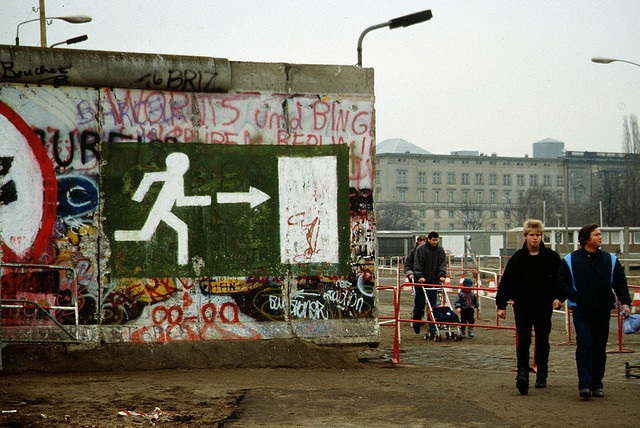
Escape route: the fall of the Berlin Wall in 1989. Physical and cultural walls often determine the fate of refugees, even in 2015. Image from Flickr, Raphaël Thiémard (CC BY-SA 2.0)
1918, 1938, 1989: the 9th of November, also known in Germany as the Schicksalstag der Deutschen (Fateful Day of the German People) is a significant day in Germany history. Along with the November Revolution of 9 November 1918, which led to the monarchy being overthrown following the end of the First World War, modern Germany still counts two major historical events on this day: Kristallnacht on 9 November 1938, the first in a series of violent pogroms led by the Nazi regime against Jews, and the fall of the Berlin Wall on 9 November 1989.
Both events hold more significance in 2015 than ever before, for it is on this exact day that the far-right group PEGIDA (Patriotic Europeans Against the Islamisation of the West) called for demonstrations, as it has been doing every Monday for over a year now.
On the night of 9 November 1938, thousands of synagogues, Jewish assembly points, Jewish shops, homes and cemeteries across the whole of Germany were destroyed. The day marked the transition from discrimination to the systematic persecution and murder of Jews during the Second World War. Social network users demonstrated their participation. This is a photo of a Stolperstein, literally a ‘stumbling block’ – a memorial plaque laid in front of the homes of those who were persecuted and deported.
Wenn Mitläufer mitlaufen und Bürger ihre Demokratie nicht verteidigen… #9Nov pic.twitter.com/9vVnLcpKKc
— Steffen Voß (@kaffeeringe) noviembre 9, 2015
When collaborators go along with things and citizens fail to defend their democracy… #9Nov
Another event was the fall of the Wall on 9 November 1989. The Berlin Wall, which separated East Germany from West Germany for over 28 years, was opened little by little on 9 November following civil protests. One year later marked the reunification of Germany. The commemoration on 9 November 2015, however, took an unexpected turn, because alongside several commemorative events, the right-wing group PEGIDA was permitted to call for demonstrations. Munich initially banned the group from holding the demonstration, but the ban was later lifted by the city's administrative court. Many Germans see marches by right-wing groups on this day as unacceptable. In many places, xenophobic offences connected to the influx of refugees took place, as did attacks on refugee shelters, as right-wing groups grew in number. The Islamophobic PEGIDA group has been calling for demonstrations across Germany from summer 2014, and scores of people, particularly in Dresden, followed that call. The PEGIDA march was heavily criticised on social media. Some saw a link between the violence perpetrated against Jews on Kristallnacht in 1938 and the xenophobic attacks of 2015:
Zwischen Nazis, die Synagogen abbrennen und Nazis, die Flüchtlingsheime anzünden, liegen heute 77 Jahre. #9Nov #progromnacht
— Georg Gauger (@georg_gauger) noviembre 9, 2015
77 years separate the Nazis who tore down synagogues and the Nazis who are setting fire to refugee shelters. #9Nov #Kristallnacht
9 November should primarily serve as a reminder, however, that xenophobia and walls are not a solution in the year 2015 either. Surmounting our physical and cultural walls is a challenge that Germany has overcome in the past.
Angst vor fremder Sprache, fremden Ritualen und fremder Kleidung? Wir haben das schonmal geschafft! #9nov pic.twitter.com/kjcV3JcA9L
— Felix von Ackern (@vonAckern) noviembre 8, 2015
Scared of foreign languages, strange rituals and different clothes? We've had that before! #9nov
Zäune sind keine Lösung. Nicht 1989. Nicht 2015. #KeinZaun #Mauerfall #refugeeswelcome https://t.co/cTc8ommxOk pic.twitter.com/bsl16a8T6h
— Amnesty Austria (@AmnestyAustria) noviembre 9, 2015
Fences aren't the solution. Not in 1989. Not in 2015. #NoWalls, #FallOfTheWall #refugeeswelcome







1 comment